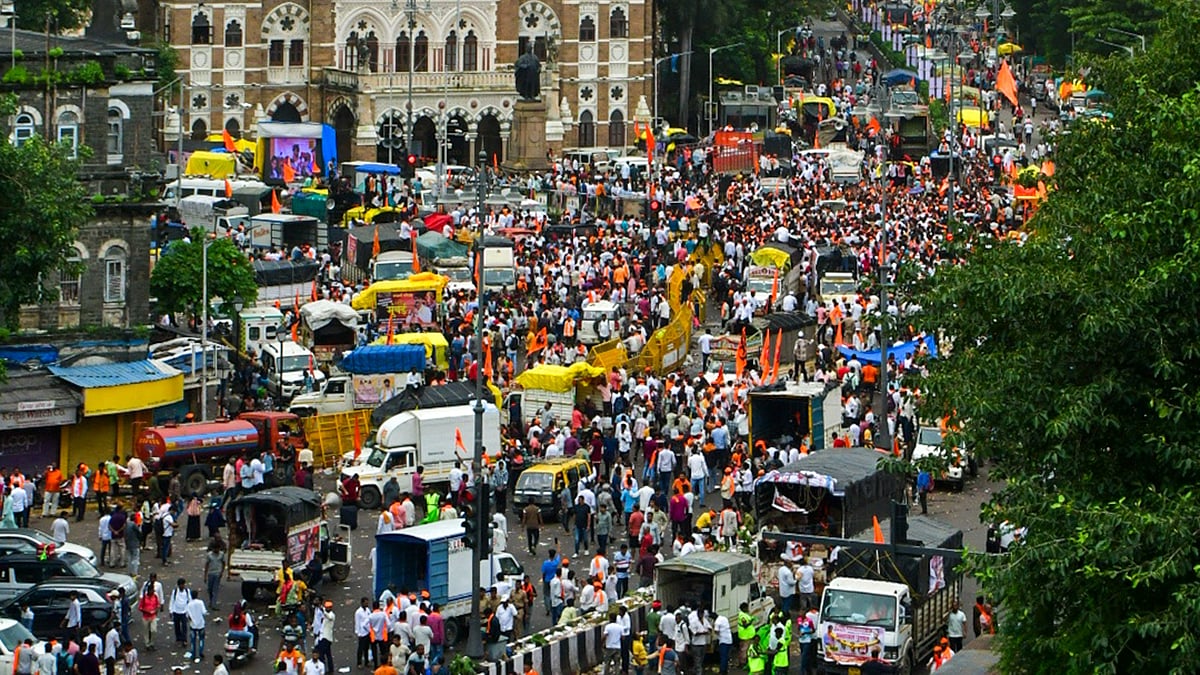POLITICS
Bombay HC pulls up state govt as Maratha quota stir stalls Mumbai
Orders protesters to vacate public places by Tuesday afternoon; HC to continue hearing matter on Tuesday

Mumbai was paralysed on Monday as thousands of Maratha quota protesters flooded the city’s streets, defying conditions set for their agitation and forcing the Bombay High Court to intervene.
The court came down heavily on both activist Manoj Jarange Patil and the Maharashtra government, observing that the ongoing protest had violated every condition of its original permission and caused chaos in south Mumbai.
During a special holiday hearing, a division bench of Justices Ravindra Ghuge and Gautam Ankhad remarked that Jarange was permitted only a day’s protest at Azad Maidan with a limit of 5,000 participants, but had instead launched an indefinite hunger strike and drawn crowds far beyond the sanctioned number.
The bench also noted that the agitation had spread beyond Azad Maidan into multiple parts of the city, disrupting life in Mumbai’s key commercial district.
The court directed the state government to evict protesters from all areas except Azad Maidan and demanded a report on the steps taken to restore normalcy. The matter will now be heard on Tuesday at 3.00 pm.
Jarange, who has been on hunger strike since 29 August, is demanding a 10 per cent quota for the Maratha community under the Other Backward Class (OBC) category.
Addressing his supporters, he warned that “more than five crore Marathas” could march to Mumbai if chief minister Devendra Fadnavis failed to act, accusing the government of deliberately delaying a decision. He urged that Marathas from Marathwada be declared Kunbis, paving the way for OBC certificates.
The scale of the protest has already tested the city’s infrastructure. Arterial routes such as D.N. Road, J.J. Marg and Mahapalika Marg were choked, while crowds at Chhatrapati Shivaji Maharaj Terminus (CSMT) caused severe overcrowding.
Published: undefined
Commuters reported delays and incidents of protesters attempting to stop vehicles, including BEST buses, some of which were diverted or suspended. Traders around Crawford Market complained of slumping sales as festival shoppers stayed away, while office-goers described being stranded for hours.
Despite a heavy police presence, demonstrators ignored instructions and even attempted to storm the Bombay Stock Exchange before being blocked at the gates. The state government admitted in court that norms had been repeatedly flouted.
Advocate General Birendra Saraf said permission had been conditional, restricted to daylight hours and without use of loudspeakers, yet protesters had disregarded all terms.
Published: undefined
Petitioner and advocate Gunaratna Sadavarte, who approached the court against the agitation, argued that the city had been “taken hostage” and alleged political backing from Opposition parties. He said even schoolchildren and differently-abled commuters were stranded due to traffic blockades.
Sadavarte further accused protesters of bringing liquor into the city, claiming that law enforcement had failed to act.
For businesses, the disruption has been costly. Viren Shah, president of the Federation of Retail Traders Welfare Association, said, “While it is their right to protest, as traders, we have to highlight that our businesses are being affected. The growing crowds are causing significant inconvenience for people trying to travel."
The crisis has also raised concerns about public safety. The court noted that even judges’ vehicles had been obstructed, while photographs presented by the government showed protesters spilling into areas such as Flora Fountain, CSMT station and Marine Drive. Schools in the vicinity declared ad-hoc holidays, with reports of students trapped in traffic for hours.
As the agitation entered its fourth day, Jarange claimed that three of his supporters had died since the start of his fast. Yet, he maintained that the movement would continue unless the state acted immediately.
The high court’s intervention has sharpened the focus on the government, which is now under pressure to balance law and order with the politically sensitive Maratha reservation issue. With more protesters expected to pour into Mumbai, the bench bluntly asked the state: “If the law is being violated, why don’t you tell them to stop protesting?”
For now, the city waits for Tuesday’s hearing, with the Maratha quota agitation showing no signs of ebbing.
Published: undefined
Follow us on: Facebook, Twitter, Google News, Instagram
Join our official telegram channel (@nationalherald) and stay updated with the latest headlines
Published: undefined